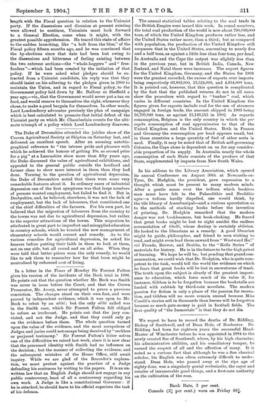In his address to the Library Association, which opened its
annual Conference on August 30th at Newcastle-on. Tyne, Dr. Hodgkin, the president, gave expression to a thought whioh must be present to many modern minds. After a gentle moan over the tedium which bookless man must have felt in the Palaeolithic and Neolithic ages—a tedium hardly dispelled, one would think, by the tile library of Assurbanipal—and a curious speculation as to the methods of stacking books before the invention of printing, Dr. Hodgkin remarked that the modern danger was not booklessness, but book-choking. He feared that great books might be lost to sight amidst the endless accumulation of libelli, whose destiny is certainly oblivion'. He looked to the librarians as a remedy. A good librarian might be guide, philosopher, and friend to men wishing to read, and might even lead them onward from" Westward Ho!" vie/ Froude, Brewer, and Stubbs, to the "Rolls Series" of materials for history. He is in the future to be the high priest of learning. We hope he will be; but pending that grand con- summation, we could wish that Dr. Hodgkin, who is quite com- petent to the task, would tell the world the evidence on which he fears that great books will be lost in snowstorms of trash. The truth upon the subject is clearly of the greatest import- ance to education, which loses much of its value if, for instance, Gibbon is to be forgotten because the bookstalls are loaded with rubbish by third-rate novelists. The modern passion for fiction is only a phase of the passion for recrea- tion, and Gibbon will no more remain unread because Miss Corelli's stories sell in thousands than heroes will be forgotten because so much gate-money is paid in football fields. The first quality of "the Immortals" is that they do not die.






































 Previous page
Previous page